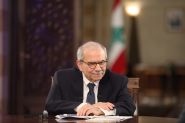US envoy and ambassador to Turkey Tom Barrack, accompanied by Deputy U.S. Special Envoy for the Middle East Morgan Ortagus, and U.S. Ambassador to Beirut Lisa Johnson on Monday held a series of meetings with Lebanese officials focused on Washington’s plan for disarming Hezbollah, following the government’s endorsement of the paper.
Barrack was first received by President Joseph Aoun who stressed that, following Lebanon’s declared position on the agreed paper, the responsibility now lies with other parties to uphold its content.
He also underscored the need for greater international support for the Lebanese Army and the urgency of accelerating reconstruction efforts in areas devastated by Israeli attacks.
Following the hour-long meeting, Barrack addressed reporters, describing the discussions as “excellent” and praising the steps taken by the Lebanese government. “We are in the middle of a process, and I know many of you feel hopeful—we too feel hopeful,” he said, adding that Lebanon is moving closer to “prosperity and peace.”
On the issue of Israeli withdrawal, he emphasized that “the next step will require Israel’s participation and a reconstruction plan covering all regions, not just the South,” noting that “the Lebanese government has done its part with the first step, and it is now up to Israel to take the initiative.”
Regarding the sensitive matter of disarmament, Barrack stressed that “Hezbollah’s disarmament is in the interest of the Shia community and not against them. In the coming weeks, we will see progress toward a better life for the Lebanese people.” He warned that “refusing this decision would be a missed opportunity, and Hezbollah must understand the best choice for development and prosperity in the country.”
He also reaffirmed that “Washington is not using threats regarding Hezbollah’s disarmament.”
Barrack further noted that cooperation with Hezbollah is a Lebanese-led process, and that US efforts aim to establish a stable communication network between Hezbollah, the Shia community, and Israel. He clarified that no US proposals have been made to Israel, and Israel has not rejected any measures. The main objective remains the implementation of the existing ceasefire agreement, not negotiating a new deal.
Finally, the envoy encouraged Lebanese citizens to take pride in their government, while emphasizing that decisions regarding disarmament fall under the authority of the Lebanese state.
The diplomat also noted that Morgan Ortagus, previously responsible for Lebanese affairs, has now joined his team.
Later Monday, Barrack met Speaker Nabih Berri and Prime Miniter Nawaf Salam.
According to a communique issued by Berri’s office, the Speaker told him that “Israel’s commitment to the ceasefire agreement and its withdrawal from Lebanese territory to the internationally recognized borders is the gateway to stability in Lebanon, and an opportunity to launch the reconstruction process, in addition to supporting the Lebanese Army.”
For his part, Salam called for international engagement to organize a conference in support of Lebanon’s reconstruction and stressed the importance of renewing UNIFIL’s mandate for its role in consolidating stability and supporting the army in exercising its authority in South Lebanon.
Salam also urged pressure on Israel to halt its military actions.
Lebanese Army Chief, General Rodolphe Haykal, had earlier discussed with Barrack the resources needed to support the army in implementing its plan, particularly in terms of assistance and logistics.


Comments